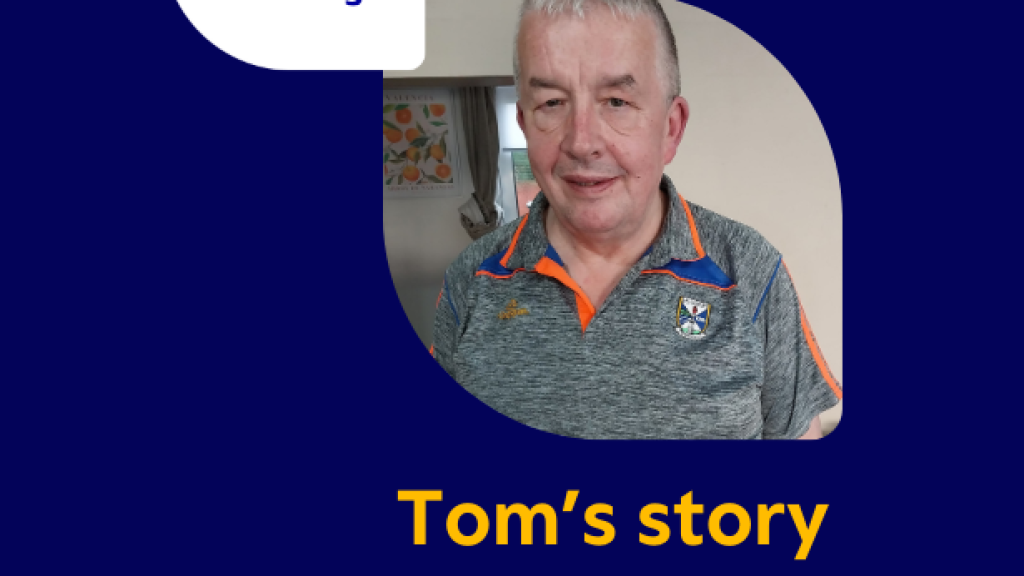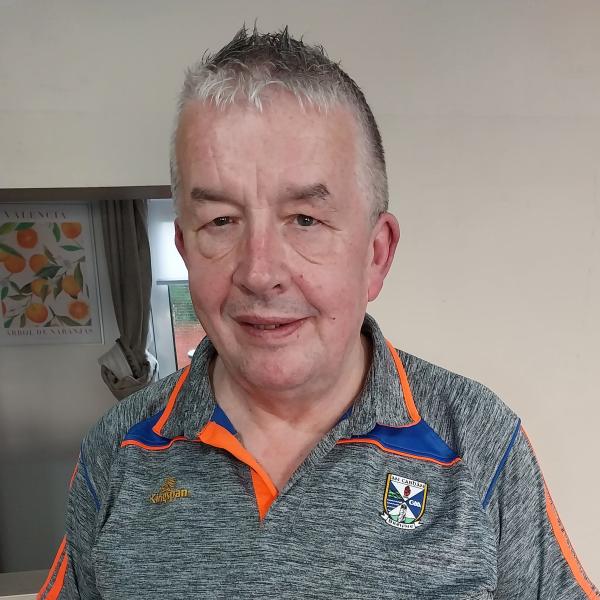

In June 2019, then aged 60, Tom Crowe felt a niggling pain in his abdomen area get worse. “I’d had this pain around my stomach kind of niggling me for a couple of weeks. This week then I was in work and it was really at me. I spoke to the boss and asked for a bit of time to go the doctor and he gave me a half day the Friday. By the time I got home, I was so exhausted I fell asleep. It wasn’t until the Saturday morning I went into Portlaoise Hospital. They done a CT scan and told me there and then I needed surgery the following day. My surgery took place on the Sunday – which was Father’s Day. It was only following my surgery and after they had removed part of my colon and done analysis on it that they could tell me it was colon cancer.”
Following his surgery, Tom experienced an infection which led to a prolonged stay in hospital. “I ended up in hospital for about six and a half weeks. I didn’t eat a thing during all that time. I lost about three and a half stone in weight. Every couple of hours I was getting sick. They wouldn’t open me back up for more surgery because I was in recovery from the first one. They discharged me twice and I ended up back within hours. The first time I was discharged, I was out about six hours and I needed to go back in through the ED. I spent two days on a trolley waiting on a bed. A while later, they tried me again at home but all through the night, I was sick again and back in the following morning. Eventually, 29 days after my first surgery, they decided they needed to do another one to remove the infection. I was a week in intensive care and after about a week to ten days, they let me home.”
"Sitting in a hospital all that time. I just remember coming to a point where I accepted the road I was on."
Coming to terms with his cancer diagnosis was difficult for Tom. “I suppose I had a lot of time to think. Sitting in a hospital all that time. I just remember coming to a point where I accepted the road I was on. Since then, I have returned to my faith. I think during that initial period, whatever bit of faith I had at the time helped me through and now that is with me more. It was very difficult and I suppose, being in the hospital every day, I wasn’t noticing much of change but it was my family coming to visit me who were seeing the real difference in how I looked. They were worried. I also remember getting an almost cabin fever from being stuck in the hospital that long. Thankfully I came through that infection and then it was a period of recovery before the chemotherapy started.”
For his chemotherapy, Tom needed to go to Tallaght Hospital. “I’d go up to Tallaght, they had to fit a port in my chest where the chemo went. Every two weeks, they’d strap this bottle of chemo around a belt and it would be attached to this port. I’d head away home and the chemo would empty and I would just go to the nearest hospital, which was Naas, and they’d remove the belt. I did that every two weeks for 6 months. 12 rounds in total. My children were brilliant bringing me to appointments and and their mother was great as well. I remember the very first day I got it done, I could feel it right in my fingers and toes and to this day, I can still feel that. Five years on that nerve-ending effect is still there.”
“My chemo finished up just as the pandemic came along. I was really quite scared to go out because I was immunocompromised."
Tom’s chemotherapy finished in March 2020. “My chemo finished up just as the pandemic came along. I was really quite scared to go out because I was immunocompromised. That initial Covid time was very hard. Even after it started to calm down a bit, I was still worried and there were weeks when the only time I left the house was to go the shops and straight home again. It was affecting my mental health. I got to a point where I hadn’t driven the car for around 4 months. I had planned a trip to go to Galway but I was really quite nervous about going. The nurse in Naas, she gave me the little push and encouragement I needed. When I got there, I phoned her to say thanks. I wouldn’t have made it without her.”
Tom was signposted to local supports to help him overcome the isolation he was feeling. “Kildare Hospital were brilliant at connecting me with groups I could speak with. Initially during Covid it was speaking with people over the phone and this gradually became in person. I found great support from HEADSUP which is ran by the Kildare Sports and Wellbeing Partnership. This gave me access to counselling services and I was able to access six free sessions. I know I can access more if I need them, but I have been doing well through peer support and just talking.”
"For anyone who is experiencing isolation or difficulties with their mental health during or after their treatment, I want that person to know it gets better."
Tom’s sharing his story to raise awareness for Bowel Cancer Awareness Month, “I am very fortunate to be where I am. I had my five-year clear scan just this year and my consultant in Tallaght said to me; ‘in the nicest possible way, hopefully I never you see again’. I’m sharing my story in the hope that anyone reading will be mindful of the signs and symptoms of bowel cancer. Like I did, if something doesn’t feel right, if you are experiencing any symptoms, go and speak to your doctor. Also, for anyone who is experiencing isolation or difficulties with their mental health during or after their treatment, I want that person to know it gets better. There are supports out there and please do reach out to them when you are ready. The last thing I want to say is I am so grateful to every single healthcare worker who has helped me on my journey – too many to mention by name.”
This Bowel Cancer Awareness Month, and every month, the Irish Cancer Society is urging the Irish public to be mindful of the signs and symptoms of bowel cancer.
Symptoms such as changes in your toilet habits, blood in your poo, weight loss, pain or bloating in your abdomen area can be caused by other things. But if your symptoms have gone on for more than 3 weeks, please go to your GP.
We are also urging all those who are eligible to take part in lifesaving bowel cancer screening.
For any bowel cancer related queries, you can also contact the Irish Cancer Society’s freephone Support Line at 1800 200 700 or email supportline@irishcancer.ie.
